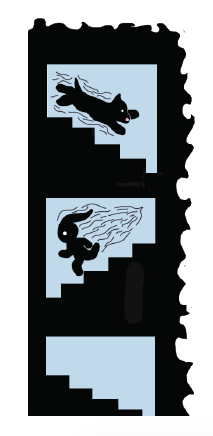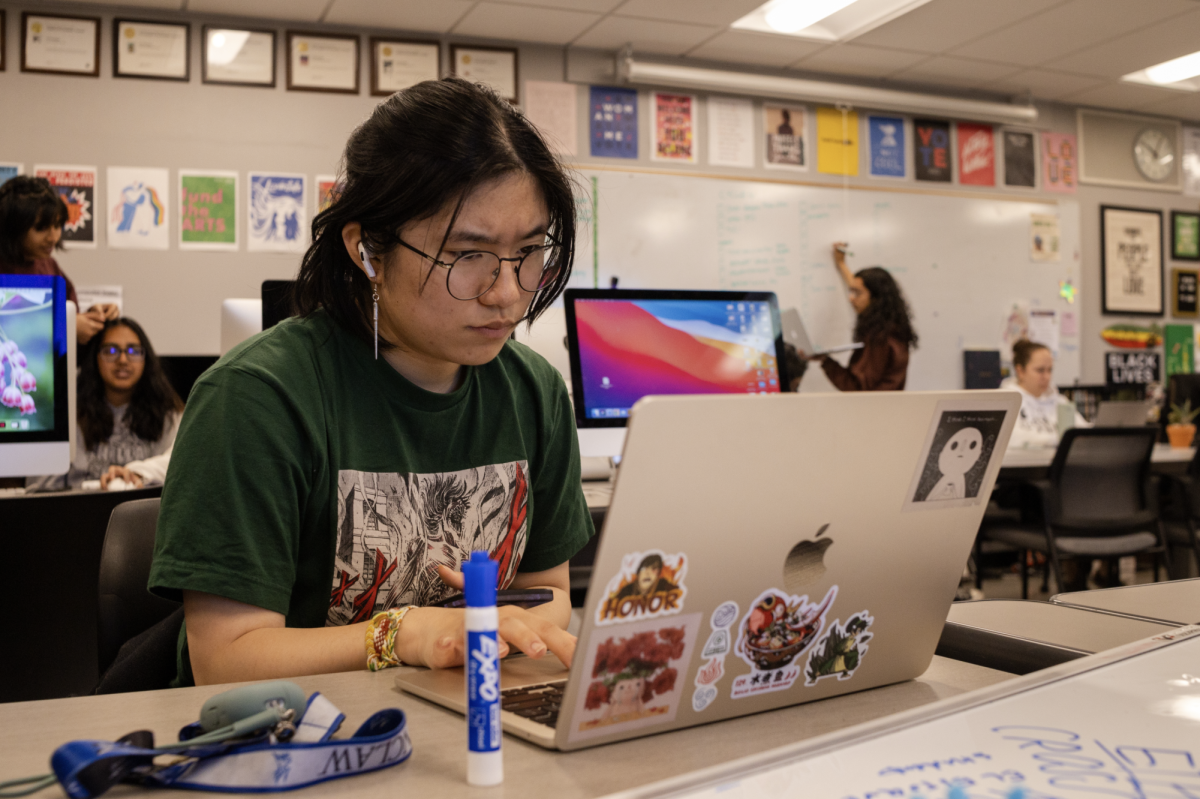The world flies by in a blur as Lillian presses her face against the cool glass of the car window. As the seconds pass, her parents’ voices rise from a heated conversation to reverberating yells, drowning out the music. Lillian’s mind goes blank and her thoughts scatter, voices echoing in her mind. Her heart beats wildly, her hands clenched in fists. Gasping for breath, she fumbles for her earphones and jams them into her ears. The soothing music flows through her mind, calming her stumbling thoughts and the voices in her head are silenced.
Lillian is a student at MVHS who harbors an extreme phobia, or an irrational fear. She has asked to remain anonymous, so for the purposes of this story, she’ll be referred to as Lillian. Lillian has social anxiety, which, according to the Social Anxiety Association, is the phobia of being negatively judged by other people. Her phobia originated, not from one traumatic event, but over a period of time, slowly escalating.
“In seventh grade, I had this very mean friend who was very emotionally abusive,” Lillian said. “She constantly blamed me for her depression — she constantly put me down. I was scared to go to school everyday. That transferred into an irrational fear.”
Having social anxiety, Lillian finds it difficult to handle one-on-one conversations for large periods of time and remain calm in socially-toxic situations. Having parents who argue constantly only heightens her phobia.

“[My dad] and my mom will get into arguments,” Lillian said. “And I’m an only child, so I’ll always get stuck in the car [during a fight]. If a fight happens, then I can’t do my homework after. I just can’t concentrate on anything.”
The emotionally unstable atmosphere Lillian has grown up in has shaped her phobia and caused her to fear social interaction. Due to Lillian’s social phobia, these family issues are amplified in her head, consuming her mind. Lillian’s dad is a heavy drinker and often attends concerts. Lillian explains that he behaves in a brash manner afterward.
“My mom and I normally have to go and pick him up [from the concerts.] So one time, we were driving along and [my dad and his friend] were making very drunk comments,” Lillian said. “I was freaking out internally. I was hyperventilating, constrictions in my chest and I could not handle it at all. I was over-exaggerating it in my head.”
Lillian is not alone in having an extreme phobia that has impacted her daily life. According to the National Institute of Mental Health, approximately four to five percent of people in the U.S. have one or more significant phobias, and teens are most susceptible to these irrational fears.
Student advocate Richard Prinz is an expert about phobias and their impact on people. He has helped students acknowledge and overcome their phobias. Additionally, he himself has experience with relentless phobias.
“A phobia is defined as an irrational fear or relentless dread of a situation, creature, place or thing,” Prinz said. “Social phobia would affect [someone] daily. I’ve met some people like that, where it’s hard [for them] to interact.”
Phobias incorporate themselves into daily life in varying degrees. Some phobias, such as social phobia, are difficult to avoid, as they become inextricably entwined in a person’s routine.
“I have very high-functioning social anxiety so I can do daily activities; it’s just constantly in the back of my mind,” Lillian said. “If I have prolonged periods of just talking, my chest will constrict and I’ll have trouble breathing. It gets very overwhelming, my heart will always start racing.”
Prinz explains that phobias do not always develop as a response to personal experiences. He reveals that phobias can also be learned.
“[People with phobias] could have learned it from a family member who has a fear, and then they pick up that fear,” Prinz said. “My mom was afraid of being alone, so I noticed that when I got older, I was afraid of being alone. I thought it was my fear, but it was something I learned.”
While Prinz’s phobia was learned, phobias can have other origins. Senior Esha Desai has an extreme case of cynophobia, the phobia of dogs. Desai explains how her phobia developed in her childhood.

“I think I was around 11 years old,” Desai said. “I used to live in India and I lived in an apartment complex. I was going to visit a friend’s house when a dog suddenly ran from upstairs. I was probably on the 20th or 19th floor, and I was really scared so I started running down. I continued to run down 19 floors, and at that point I didn’t know that dogs think you’re playing with them if you’re running with them.”
Although every phobia triggers a response of some degree, certain people have more drastic responses. Due to Desai’s extreme response to dogs, she has to take precautions to ensure that her phobia does not take control of her mind.
“Whenever I go to [my friends’] houses, they have to put their dogs in a different room or I have to go to a different room,” Desai said. “Even at school when they bring in the dogs for a day, I usually walk 100 feet away.”
Meanwhile, Lillian experiences panic attacks as a result of her phobia. For Lillian, family contributes to her phobia, both helping her control her phobia — and being a cause of her panic attacks.
“With my grandma living with us, it gets very frustrating because we both [my mom and I] have to take care of her. I will get very overwhelmed when my grandma asks for too much when I have prior obligations,” Lillian said. “So my mom will just drive us out. We usually just drive and get ice cream. But it’s just getting out of that situation.”
Prinz explains that people who have extreme phobias need to develop coping mechanisms, to ensure that they have a method to regain control of their mind. He describes his own experiences as a child, when he was influenced by his mother’s phobia and how he is beginning to slowly face his fears.
“My mom, when my dad went out, she would go to the neighbor’s and stay there,” Prinz said. “She was very social and was always being with people. When I became an adult, I started to see that if I was alone, I started to get anxious. I think the mark of it is you start to feel anxious, because it’s an anxiety disorder. So that was when I saw that I caught it. I’ve been working on it by putting myself in situations where I’m alone, doing meditation retreats and being in the mountains and cabins.”
Prinz explains that while minor phobias can be controlled through individualized methods, at one point, a person cannot face a phobia alone and requires professional help. Lillian has been attending therapy for several years now. She finds therapy sessions improve her well-being tremendously. He recommends not bottling up fears and being open.
“I know there’s a stigma about the mind,” Prinz said. “If we have a physical thing, we go to the doctor, but if we’re struggling with something mental, we think ‘I don’t want anybody to know. I don’t want anyone to think I’m crazy.’”
Lillian explains that having a close-knit group of friends who understand her has helped her cope with her phobia. Lillian relies heavily on her friends and is always accompanied by a “support person” whenever she is in an unfamiliar situation.
“All my friends are very accepting of my anxiety and they never push me into situations where I’m not comfortable,” Lillian said. “A lot of my other friends have other mental problems, like depression, anxiety, so we can all relate. It’s finding friends with similar interests to you. They’ll understand you and have a deeper bond with you.”
Lillian explains that though she has encountered countless obstacles her phobia has thrown her way, through it all, she’s learned to trust people and look for the best in them.
“Know that you have a support system,” Lillian said. “I know it’s hard to say, but don’t be afraid to tell people [about phobias] because normally they’re very understanding. Just know that everyone accepts you.”























